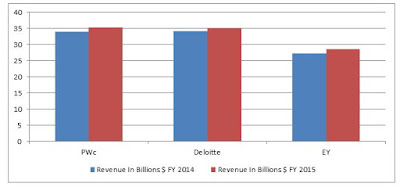The Big Four firms have recently
announced their results for the fiscal year 2015. PwC has retaken number one
spot from Deloitte as the world’s largest firm by revenue. KPMG is yet to
announce its results.
A brief overview of the performance
of these firms in comparison with the previous year is as follows.
PwC has recorded a global annual
revenue increase of 10% to $35.4bn (£23.34bn), which represents its strongest
growth in 10 years. Consulting now accounts for more than 30% of PwC’s total
revenues after growing 18% to $11.2bn during the 2015 fiscal year. This was
boosted by the acquisition of Strategy& (formerly Booz & Company) in
April 2014. Revenues
in PwC’s auditing division grew more slowly, rising 6.2 per cent to $15.2bn in
a year marred by the profit misstatement scandal at Tesco, a PwC audit client.
According to Dennis Nally, Chairman
of PricewaterhouseCoopers International Limited,
“As we look at the results for the
last 12 months, all of our lines of service showed really positive growth – led
by Advisory which is up 18%, Tax up 7% and our Assurance business notwithstanding
some really difficult competitive market pressures – up 6%.”
Deloitte refers to one or more of
Deloitte Touche Tohmatsu Limited, a UK private company limited by guarantee
(“DTTL”), its network of member firms, and their related entities. Deloitte
provides audit, consulting, financial advisory, risk management, tax and
related services to public and private clients spanning multiple industries.
Deloitte
member firms (Deloitte) reported aggregate revenues of US$35.2 billion for the
fiscal year ended 31 May 2015 (FY15), representing 7.6 percent growth in local
currency terms.
EY
announced combined global revenues of US$28.7b for its financial year ended 30
June 2015. This represents an 11.6% increase over financial year (FY) 2014
revenues in local currency, outpacing FY14 growth (which had increased by 6.8%
over FY13).
All
of EY’s service lines continued to grow in FY15 ahead of their FY14 growth:
Advisory grew 17.6% (vs. 14.4% growth in FY14); Assurance 8.1% (vs. 4.5% in
FY14); Transaction Advisory Services (TAS) 15.5% (vs. 6.5% in FY14); and Tax
10.3% (vs. 4.3% in FY14).
In
FY15, EY headcount reached 212,000 globally – an all-time high.
A graphical representation of the performance of these three
firms is shown for comparison purpose.
Head
Count Graph
Revenue Graph
KPMG is due to report its 2015 results
in December. KPMG
International Cooperative ("KPMG International") is a Swiss entity.
Member firms of the KPMG network of independent firms are affiliated with KPMG
International. We are presenting here KPMG’s 2014 and 2013 performance
comparison.
The
KPMG network delivered strong growth and recorded-high revenues of USD24.8
billion for the 2014 fiscal year, an increase of 6.3 percent in local currency
terms over the prior year (2013), recording growth across Audit, Tax and
Advisory.
Head Count Graph
Revenue Graph
References:
- http://www.pwc.com/gx/en/about-pwc/global-annual-review-2015/campaign-site/pwc-global-annual-review-2015.pdf
- http://www2.deloitte.com/content/dam/Deloitte/global/Documents/About-Deloitte/gx-gr15-summary-final.pdf
- http://www.ey.com/GL/en/Newsroom/News-releases/news-ey-reports-2015-global-revenues-up-eleven-point-six-percent
- https://home.kpmg.com/xx/en/home/media/press-releases/2014/12/kpmg-delivers-strong-growth.html














